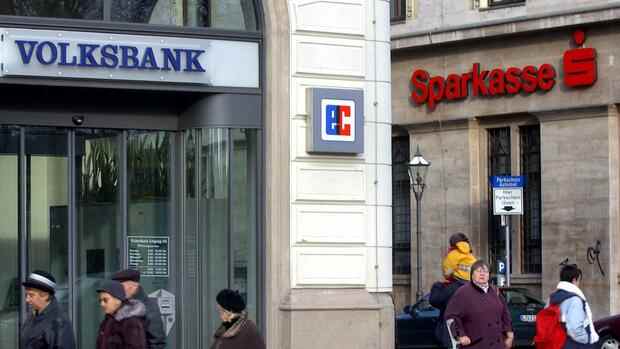There is contention in the struggle to set up a European payment system, EPI. Savings banks go to the cooperative banks.
(Photo: picture-alliance / ZB)
Frankfurt The withdrawal of the cooperative DZ Bank from the project to set up a European payment system, EPI for short, is causing frustration among the German savings banks. Your lobby association DSGV attacked the cooperative banks on Wednesday after their EPI rejection – without explicitly naming them.
“We see the most important providers in the German market as responsible for making their contribution so that a joint European offer can start successfully,” said the DSGV on Wednesday. As the largest economy in Europe, Germany is particularly important for the success of EPI.
The market leaders in the German banking market are the savings banks, followed by the cooperative banks. Commerzbank had already withdrawn from the European Payments Initiative (EPI), and Hypo-Vereinsbank (HVB) also announced on Wednesday that it was leaving. Deutsche Bank did not comment.
It has long been clear to those involved that HVB will not participate in EPI. Many also considered the withdrawal of Commerzbank to be manageable because of their manageable number of customers. However, the situation is different for the cooperative banks, which account for a third of the German banking market.
Top jobs of the day
Find the best jobs now and
be notified by email.
The German Savings Banks and Giro Association (DSGV) emphasized that the Savings Banks Finance Group had supported the initiative to set up a common European payment system from the start and was still willing to do so. “This important project will not fail because of us.”
Nevertheless, there are signs that the savings banks are also withdrawing. According to insiders, several internal meetings are scheduled for the next few days.
DSGV is now raising doubts about EPI: “However, if other necessary contributors cannot decide to participate, the savings banks will make other innovative offers to their customers,” he explained now.
On Tuesday evening, the Handelsblatt reported that DZ Bank, the central institute of the Volks- und Raiffeisenbanken, was finally canceling its participation in the prestige project. The Federal Association of Volks- und Raiffeisenbanken (BVR) explained that DZ Bank’s participation was not possible on the basis of the last proposal by the EPI interim company.
After the departure of various shareholders of the interim company, the cooperative financial group has also worked intensively in recent months to “find a solution that reconciles customer interests and functional added value with a high level of distribution and should enable the banks involved to offer an economically viable solution. “
Investments of 1.5 billion euros were expected for EPI
With the withdrawal of the comrades, it is highly uncertain whether EPI will continue at all. According to those involved, a fundamental decision on this could be made by Friday.
The savings banks play a prominent role in the initiative. DSGV board member Joachim Schmalzl is the head of the supervisory board of the EPI interim company, which is supposed to prepare the actual construction of a payment system.
EPI was founded in 2020 by several major banks. The aim was to create its own payment system in order to become more independent of powerful US corporations such as Mastercard, Visa and Paypal. By 2026, those involved are calculating investments of around 1.5 billion euros. It is known that the savings banks have already approved EUR 150 million for this purpose.
31 banks and two payment service providers are involved in the EPI interim company. However, many of the institutes have since turned their backs – including several Spanish financial institutions. The Italian banks are not directly involved. Financial institutions from Spain and the Netherlands also reject EPI.
“The remaining range and relatively high initial investments are no longer consistent – the essential prerequisites for a strategic investment are therefore not met,” Commerzbank explained in mid-January. “That’s why we will not participate in EPI at this point in time.” The Hypo-Vereinsbank now expressed the same verbatim.
The dispute over EPI could cause lasting resentment in the German banking sector. This is also important because the savings banks and cooperatives cooperate on other projects, especially in payment transactions.
The financial institutions have been working for a long time under the keyword “#DK” to bundle their various national payment offers. It’s about the Girocard (better known by its old name “EC card”), the online payment methods Giropay and Paydirekt – which were not very successful – and the mobile-to-mobile payment service Kwitt.
More: Cancellation from Berlin: Banks will not receive any funding for the new EU payment system
